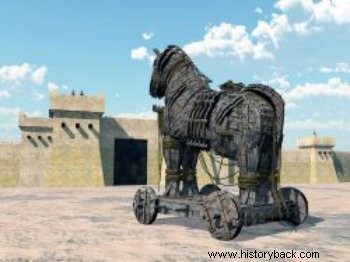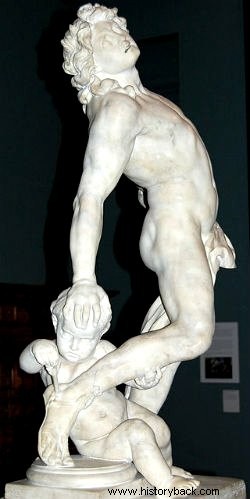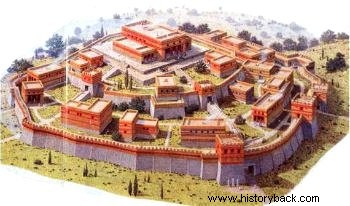The Trojan War was fought in the Bronze Age between Greeks and Trojans, beginning in 1300 BC. and would have lasted a decade.
The conflict was narrated in two epic poems:theIliad , which deals with battles; and the Odyssey , which narrates Odysseus' return home. Both were attributed to the Greek poet Homer.
Abstract
Troy would be in what is now Western Turkey, according to archaeological evidence.
The reason for the war would be the kidnapping or the escape of Queen Helena from Sparta. She had run off with the prince of Troy, Paris. The situation infuriated the Spartan king Menelaus, who ordered the siege of Troy.
Menelaus convinced his brother Agamemnon, King of Mycenae, to lead the effort to retrieve the queen.
Achilles, Ulisses, Nestor and Ajax took part in the assault with Menelaus, who were supported by a fleet of a thousand ships.
After crossing the Aegean Sea, the Greeks besieged Troy for ten years.
The Trojan Horse

Illustration with the representation of the Trojan horse
The end of the war took place from an unusual strategy to enemy territory. Led by Odysseus, the Greeks built a huge wooden horse.
They offered the horse as a gift of peace to the Trojans and pretended that they were packing up their belongings to embark. However, inside the horse were the elite of Greek soldiers.
The peace offer was accepted by the Trojans, who opened the city's gates and brought the "gift" inside its walls.
At night, however, the detachment that was hiding inside the horse, got out of it, and opened the gates for the troops waiting outside.
The Greeks destroyed the city, proclaimed themselves victors, and ended ten years of conflict. The episode gave way to the expression "Greek's gift ".
Queen Helena returned to Menelaus' side, but he, angry, sent her into exile as revenge for so many years of war and instability.
The return of Odysseus, one of the most brilliant Greek strategists, was quite bumpy and his adventures were narrated in the Odyssey . There, he recalls several episodes of the conflict.
Iliad and Odyssey
The Iliad works and Odyssey , by Homer, would have been written in 750 BC. and 725 BC. respectively. The stories resulted from oral tradition maintained centuries after the war.
The main episodes, such as the use of the horse, follow the narrative model called "epic cycle".
The imagery surrounding the Trojan War inspired the Roman poet Virgil to write "Aeneid", in the 1st century BC
Learn more about the Iliad and the Odyssey.
Achilles
Achilles is the main character of the Iliad and in Greek legend he is a demigod elected to die young in battle.
Fearing fate, Thetis, Achilles' mother, plunged him as a baby into the waters of the River Styx, also called the infernal river, to make him invincible.
The bath, however, was not complete and the Achilles heel, exactly where the mother held it, was not touched by the water. This is the origin of the expression "Achilles heel ", because it indicates a person's weakest point.

Sculpture of Achilles Dying by By Christophe Veyrier and Miguel José Joseph (1683)
Thetis tried yet another way to preserve her son's life and raised him as a girl. The strategy did not go well and Ulysses, when he learns that only with the help of Achilles could he win the war, identifies him among the women of the island of Cyros.
As the prophecy stated, Achilles dies young in battle when he is hit by a poisoned arrow in the heel. He does not die without first proving to be a brave and faithful warrior, as Homer's accounts narrate.
Did the Trojan War Happen?

Recreation of the city of Troy
Did the Trojan War actually happen or was it just a cycle of mythological legends?
Many scholars believed it was nothing more than a beautiful work of fiction. But recent research has found that there was indeed a conflict between the Greeks and the peoples of the Anatolian region.
However, the lack of any historical sources for Hittites – people who also inhabited that territory – calls this argument into question.
Thus, the veracity of the Trojan War cannot yet be confirmed.
Movies
The Trojan War has inspired a multitude of artworks over the centuries. With the invention of cinema, several directors took their version of the conflict to the screens.
- Helena of Troy , Robert Wise. 1956.
- The Trojans , by Michael Cacoyannis. 1971.
- Troy , Wolfgang Petersen. 2004.
Read more:
- Hittites
- Achaeans
- Pre-Homeric Period
- Ancient Greece
- Greek Mythology
